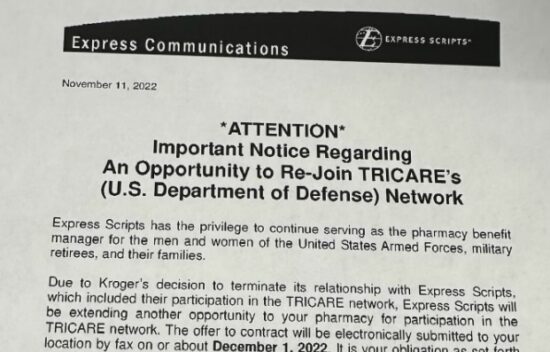Tricare wants indy pharmacies back, the paralyzed can walk, existing addiction cure, and more
14 Nov 2022
Posted by Andrew Kantor
Breaking news
Tricare ‘rethinks’ its decision on excluding independent community pharmacies
Express Scripts will accept community pharmacies back into the Tricare network after Kroger terminated its relationship with the PBM.
“Express Scripts will be extending another opportunity to your pharmacy for participation in the Tricare network,” it wrote in a fax sent Friday afternoon. It seems that, sans Kroger, Express Scripts and Tricare suddenly find themselves needing to fill their pharmacy network to avoid even more angry servicemembers, veterans, and their families.
Pharmacies will receive more information on December 1, and will have about two weeks to accept the offer to come back to the network.

Once more with (bad) feeling
Getting Covid-19 a second time — whether you’re vaccinated, partially vaccinated, or unvaccinated — is likely to be worse than the first time.
Reinfected patients had a more than doubled risk of death and a more than tripled risk of hospitalization compared with those who were infected with Covid just once. They also had elevated risks for problems with lungs, heart, blood, kidneys, diabetes, mental health, bones and muscles, and neurological disorders.
So while being vaccinated (or having been infected) will reduce your chance of getting Covid again, if you do get it … that’s bad news.
A cure for addiction?
Drug addiction is caused (at least in part) by the peptide orexin. Turn up orexin production and you get drug-seeking behavior; addiction happens when orexin-producing cells don’t turn off. “They stay on constantly, producing high levels of orexin that motivates one behavior: getting another hit.”
So if you want to stop addiction … well, block the orexin, right? Right.
You know what are orexin antagonists? Belsomra, Davigo, and Quviviq — the sleep aids. And Rutgers researchers have found that low doses of any one of those can not only reduce cravings in rats, it works in people, too.
An addiction treatment? Probably. As always, though, more research is needed.
Coming soon: injection-free insulin (and cancer meds)?
Attaching a tiny little* peptide to medication that would normally be dissolved in the intestines allows it to instead be absorbed into the bloodstream.
“Because they are relatively small molecules, you can chemically attach them to drugs, or other molecules of interest, and use them to deliver those drugs orally,”
Potential: creating pills to deliver meds that currently need a needle.
* Not just little — tiny little
Another cure for type 1 diabetes
The other day we told you how Georgia Tech cured type 1 diabetes (potentially). Now Stanford biologists have done it as well, with a completely different approach.
Their procedure is a ‘double transplant’:
- Insulin-secreting pancreatic islet cells (from a donor, not necessarily the patient)
- A new kind of blood stem-cell transplant — from the same donor — designed “to hobble, rather than eliminate, the recipient’s immune system”
The result is a patient with “a fully functioning, chimeric immune system” that recognizes the donated islet cells as self and allows them to take hold and start producing insulin.
Next step: Can they produce those pancreatic islet cells in the lab to avoid the difficult task of harvesting them?
The latest potential Alzheimer’s treatment
Green tea and red wine. Well, catechins in the tea and resveratrol in the wine. Maybe.
Tufts biomedical researchers found those two compounds had “really robust prevention of beta amyloid plaques” and were also safe. Well, in the lab, at least. In the real world, it’s tougher.
Some compounds do not cross the blood-brain barrier, which would be essential in the case of Alzheimer’s, and some have low bioavailability, meaning they are not readily absorbed into the body or bloodstream.
Still, it’s fodder for other researchers and, of course, pharmaceutical makers.
Huddled masses, subsidizing our healthcare
Okay, I’ll admit this one was a surprise. How much does treating immigrants cost US taxpayers? It turns out immigrants actually pay more into the system — in the form of taxes and insurance premiums — than they use in care.
A group of public health researchers from several universities decided to see what was what. They analyzed the data from more than 200,000 people and found that …
…immigrants contributed $58.3 billion more in premiums and taxes in 2017 than insurers and government paid for their health care.
Even more surprising (1): “Undocumented immigrants accounted for most (89.0%) of the surplus.”
Even more surprising (2): “US-born citizens incurred a net deficit of $67.2 billion” — meaning our healthcare is being funded by … the national debt. Zoiks.
Just … wow
Nine people who were paralyzed are now able to walk again.
Neuroscientists knew that stimulating spinal nerves with electrical signals could restore some function, but the how wasn’t clear, so that information couldn’t become actual therapy. But now Swiss researchers identified exactly which nerve groups were involved — “a single population of previously unknown neurons” — and focused the stimulation there.
The spinal cord was stimulated by a surgically implanted neurotransmitter. Meanwhile, patients also underwent a process of intensive neurorehabilitation that involved a robotic support system assisting them while they moved in multiple directions.
The patients went through five months of stimulation and rehabilitation, four to five times per week. Amazingly, all of the volunteers were then able to take steps with the aid of a walker.
The Long Read: Glucose-Monitoring edition
Why are people without diabetes using glucose-monitoring systems? And is it worth it? “Has the Time Come for Glucose Monitors For People Without Diabetes?” considers the answers.


